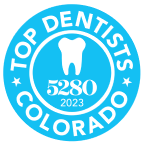First, congratulations! Pregnancy brings with it many changes for your body, and your mouth isn’t exempt. Most of your attention and energy will focus on preparing for Baby, eating healthy, and learning how to be a new parent.
However, the hormone fluctuations you’ll experience will have some impact on your gum health. We want to help you avoid gum disease because it can negatively affect a pregnancy. Furthermore, you need to know how to handle your dental care, including checkups and cleanings, until Baby is born.
In today’s blog, we’ll share tips to help you maintain good oral health and practice good dental care during pregnancy. We’ll also review how to take care of an infant’s mouth until teeth begin to develop, which happens around age four to six months.
Dental Care and Gum Health During Pregnancy
 During puberty, pregnancy, and menopause, women experience hormonal changes. With these life stages, gums can become red, swollen, and tender. This is a normal reaction to hormone changes and isn’t cause for concern. Similar symptoms present when a person develops gum disease, and because gum disease can cause complications with pregnancy, it’s important to know whether your symptoms are normal or cause to call the dentist.
During puberty, pregnancy, and menopause, women experience hormonal changes. With these life stages, gums can become red, swollen, and tender. This is a normal reaction to hormone changes and isn’t cause for concern. Similar symptoms present when a person develops gum disease, and because gum disease can cause complications with pregnancy, it’s important to know whether your symptoms are normal or cause to call the dentist.
Gum disease affects about half of the population and has been linked to increased risk for systemic health issues, like heart disease, stroke, respiratory problems, and cognitive diseases. In addition, gum disease can contribute to low-weight and/or pre-term births.
Regardless of how diligent your dental care routine was before pregnancy, practicing good, daily oral hygiene at home is now more important than ever. In the morning, you must brush your teeth. If brushing causes you to gag or you suffer from morning sickness, eat a few crackers before getting out of bed. Wait to brush until the nausea has passed, if possible.
Use a soft-bristled toothbrush and fluoridated toothpaste, and brush thoroughly in the morning after breakfast and in the evening after dinner. (If you get sick throughout the day, pack a travel toothbrush, floss, and mouthwash in your bag to use when needed.)
Floss at least once a day, and if only once, do it before nighttime brushing. Rinse with a fluoridated mouthwash after brushing and flossing. Your gums may bleed a bit if they’re swollen. That’s okay.
If you notice pus at the gum line, a foul odor even after brushing, or bleeding every time you brush and floss, schedule a dental visit. Should you develop gum disease, our dentists or hygienists will work with you to control the disease until after Baby is born. Then you can undergo a deep cleaning and make some changes to your daily dental care routine to help deter recurrence.
Checkups, X-rays, Cleanings, and Treatments
We will always put your safety, and your child’s, first when planning dental care.
When you book your visit, be sure to tell us that you’re expecting. The dentist will most likely postpone x-rays. Regular, six-month dental cleanings are safe for pregnant women, and they also help deter gum disease. If you develop gum disease and need a deep dental cleaning, the dentist may put it on hold until after you give birth.
As for restorative dental care, some simple dental procedures can be done during pregnancy, while others will be postponed until after Baby comes. We will communicate clearly with you, but please ask questions for clarity if needed.
Caring for Your Infant’s Toothless Smile
Once Baby is home, keeping his mouth clean should become an after-feeding ritual. Dental care for infants is simple. With a soft, clean, damp washcloth or gauze, gently rub along Baby’s upper and lower gums, between the lips and jawbone, then rub the upper palate and tongue.
Repeat the cleaning ritual with a fresh washcloth after every feeding. You can opt to use a baby tongue scraper, though it’s not essential that you do. Cleaning Baby’s mouth will help reduce bad bacteria and the risk of developing thrush.
Thrush is a type of yeast infection common in infants. It looks white, like formula, but won’t rub off. Thrush normally appears on the soft tissues of the oral cavity. It is not harmful and should subside within a few days. If it doesn’t, your pediatrician may prescribe an antifungal.
Dental Care During Pregnancy
If you are a soon-to-be-mom, yay! Give Metro Dental Care a call today at 303.534.2626 to schedule your six-month checkup and cleaning, or to book a consultation in our Denver dental office. We will be happy to answer all of your questions about dental care during pregnancy, and we can explain in more detail how to care for your infant’s oral health.

